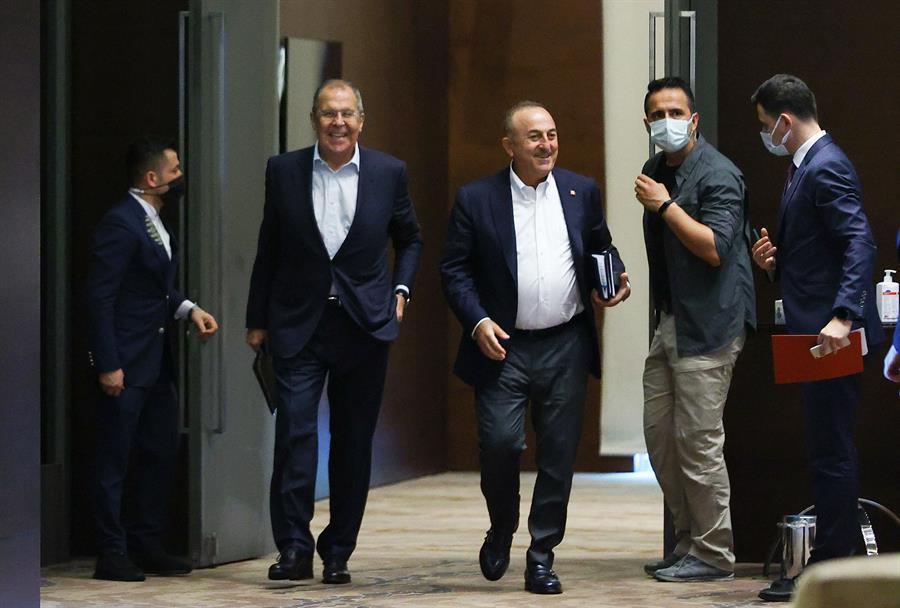
Turkey's Kanal Istanbul mega-project will not impact proper governing of the Turkish Straits, the Turkish foreign minister told his Russian counterpart on June 30 after bilateral talks.
The planned alternate route between the Sea of Marmara and the Black Sea – set for completion in 2025-2026 – will have no effect on the 1936 Montreux Agreement on the Turkish Straits, nor vice versa, Turkey's Mevlüt Çavuşoğlu told a joint news conference with Russia's Sergey Lavrov.
"The maximum capacity for safe passage through the Bosphorus is 25,000. But currently, this figure has exceeded 45,000. We calculated that this figure will be 80,000 by 2050. Since it's needed in all respects, we've now started to take concrete steps to implement the vision project put forward by our President (Recep Tayyip Erdoğan) years ago," the Turkish minister said.
Çavuşoğlu underlined that Turkey has implemented the Montreux Agreement to the letter and has been faithful to the treaties it has signed.
Speaking to reporters in the Mediterranean resort city of Antalya, Lavrov said: “Russia is pleased to work with our Turkish colleagues on the implementation of the Montreux Agreement.”
Montreux gives Turkey control over its straits and authority to regulate the transit of naval warships.
Lavrov added that the canal’s construction will not prepare the ground for foreign military deployments.
Turning to Syria, an issue Moscow and Ankara have worked on for years, Çavuşoğlu said that Turkey will continue to work with Russia for peace and a political process for the war-battered country.
On Libya, Çavuşoğlu said that the North African country’s political unity and territorial integrity are priorities that both Turkey and Russia agree on.
"Our aim is to ensure stability, peace, and tranquility in all these countries. Particularly in Syria, we'll continue to work with Russia for a political process, for the continuation of calm on the ground," he said.
On last fall’s military conflict between Armenia and Azerbaijan – which ended in November with a Russian-brokered cease-fire – Lavrov said: “Russia wants Armenians and Azerbaijanis to live as good neighbors and urges reconciliation.”
“We appreciate the activities of the joint command center (with Turkey) in Azerbaijan,” added Lavrov.
In 1991, the Armenian military occupied Nagorno-Karabakh, or Upper Karabakh, internationally recognized as Azerbaijani territory, and seven adjacent regions.
Last Sept. 27, the Armenian army launched attacks on civilians and Azerbaijani forces and violated several humanitarian cease-fire agreements.
During a subsequent 44-day conflict which ended under a deal signed on Nov. 10, Azerbaijan liberated several cities and nearly 300 settlements and villages from Armenian occupation.
Tourism and vaccination
Noting that Turkey has signed agreements to mutually recognize vaccine certifications with countries such as Greece, Bulgaria, Serbia, and Hungary, Çavuşoğlu said Ankara had proposed a similar deal with Russia.
Turkey has received 400,000 doses of Russia's Sputnik V vaccine against the novel coronavirus, Çavuşoğlu added that institutions were working together on the joint production of this vaccine.
“Russian citizens see Antalya as an attractive destination, and we will continue our efforts to develop relations in the field of tourism,” Lavrov added about the Turkish Riviera resort.
Traditionally a top destination for Russian tourists, Turkey, like the rest of the world, last year had to shut down most tourism in the face of the coronavirus pandemic.
"It was the right decision for Russia to lift flight restrictions on our country as of June 22," Çavuşoğlu added.
Citing a 20% fall in trade volume between the two countries last year, Çavuşoğlu noted that from January to April, trade had climbed 20%, compensating for 2020's decline. He stressed that the two countries hope to raise the total to $100 billion per year.
But vastly improved coronavirus numbers in Turkey, along with a vigorous vaccination campaign and strong safety measures, have reopened the country to tourism, and Russia last week gave green light to full flight service to Turkey.